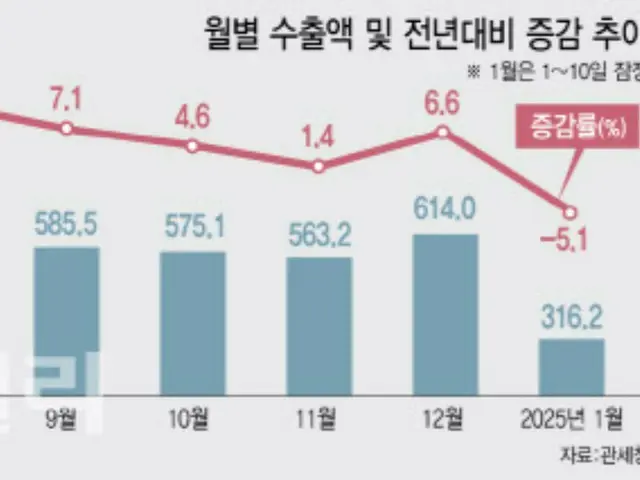According to the Korea Customs Service, exports from January 1 to 20 this year totaled $31.6 billion (approximately 4.9 trillion yen, provisional value based on customs clearance), down 1.2% from last year.
This is a 5.1% decrease from the same period last year. Exports were sluggish across the board for most items and regions. Exports of semiconductors, South Korea's largest export item, increased 19.2% from the previous year to $6.3 billion (about 9,800
billion yen), but passenger cars (down 7.3%), steel (down 3.2%), oil (down 29.9%), ships (down 16.2%), and auto parts (down 10.1%)
Exports of almost all items, except for semiconductors, including wireless communication equipment (down 18.8%), decreased compared to the previous year.
By region, exports to China ($6.5 billion/approximately 1.01 trillion yen) fell 4.9%.
Firstly, exports to the United States ($5.6 billion) and exports to the European Union ($3.4 billion) also fell 9.6% and 4%, respectively.
The decrease in the number of operating days compared to the previous year is also believed to have contributed to the 6.5% decrease in exports.
The trend of slowing down has not changed, with the average export value also dropping to 1.4% year-on-year. If this trend continues, it is expected that export values will decrease this month. There are still 11 days left in this month.
However, this year's Lunar New Year holiday has been brought forward from February to January, and with the addition of substitute holidays, the number of business days will be reduced by four days compared to last year. Therefore, unless the average daily export amount increases by more than 16.7%,
If this trend continues, the upward trend in exports that has continued since October 2023 is expected to turn to a decline for the first time in 16 months.
Cho In-ho, trade policy director at the Ministry of Trade, Industry and Energy, said, “As of the 20th, the average daily export amount has increased slightly, but the old
"In addition to the New Year's holiday, there are other long weekends coming up, including Chinese New Year and Vietnamese Tat, so we expect a temporary slowdown during the month."
President Trump has issued various executive orders since taking office.
The fact that the government did not completely reject the imposition of tariffs on all goods is also having a negative impact on South Korea's exports. The South Korean government has set a record high export plan of over $700 billion this year, but
In response to a question about universal tariffs on the day of his inauguration, President Trump said, "We're not ready yet, but we'll start imposing them as soon as possible."
"Every country is taking advantage of the United States, and our country is in deficit with almost every country," he said. "President Trump is a tariff-heavy nation," said Heo Yoon, a professor of international trade at Sogang University.
"As trade protectionism around the world becomes stronger, and China tries to export goods by going around (the U.S.), South Korea's exports are facing severe difficulties," he said.
"There is a risk that the difficult situation will continue," he said. The trade surplus with the United States, which the new Trump administration is closely watching, has slightly decreased since the beginning of this year. Exports to the United States (5.6 billion dollars/approximately 870 billion yen) fell 9.6%.
On the other hand, imports ($4.2 billion/approximately 653 billion yen) increased by 3.5%, and the trade balance recorded a surplus of $1.4 billion (approximately 217 billion yen).
The trade surplus with the United States was $3.3 billion, down by more than half. Choi Sang-mok, acting deputy prime minister and minister of strategy and finance, said he would soon be resigning from his post to President Trump.
On the same day, Acting President Choi held a meeting to discuss pending foreign economic issues at the Government Complex in Seoul, where he said, "We will closely monitor the executive orders that the new Trump administration will issue and consider their impact on the Korean economy."
"We will examine the impact of this and develop detailed countermeasures," he said, adding, "We will also proactively take advantage of opportunity factors, such as cooperation with the shipbuilding industry, in which President Trump has shown an interest."
On the other hand, South Korea's imports for the same period ($35.4 billion/approximately 5.5 trillion yen) also decreased by 1.7% compared to the previous year.
However, because the decline in exports was greater than the decline in imports, the trade balance recorded a deficit of $3.8 billion (approximately 590 billion yen). While the trade surplus with the United States shrank, the trade deficit with China ($1.4 billion)
/approximately 217 billion yen) also increased.
2025/01/22 07:05 KST
Copyrights(C) Edaily wowkorea.jp 107

